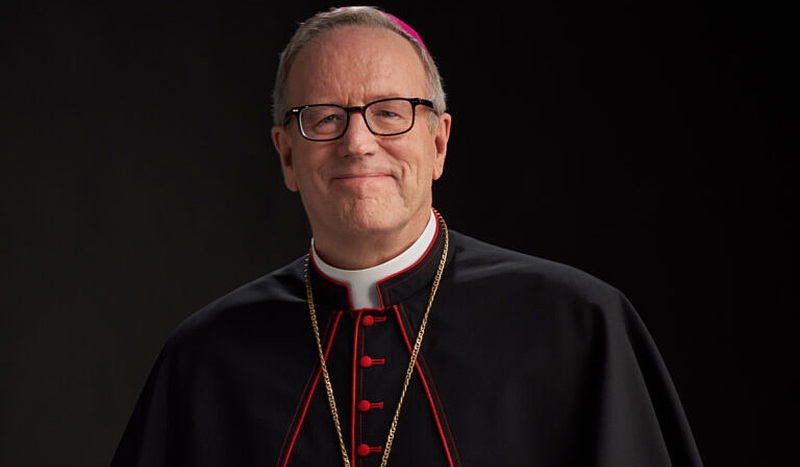
CV NEWS FEED // Bishop Robert Barron of the Diocese of Winona–Rochester and founder of the “Word on Fire” Institute strongly criticized the moral relativism evident in the “appalling congressional testimony” of three ivy league presidents who failed to say that calling for the genocide of Jewish people is a violation of their school policies last week.
“Donors, parents, alumni—wake up. Do we want to be sending our kids to schools whose presidents cannot muster the intestinal fortitude to resist calls for genocide?” Barron wrote in an article published by Word on Fire on December 9.
The article, titled “Ivy League Presidents and the Collapse of Moral Reasoning,” explores the roots of relativism present in an exchange during a December 5 Congressional Hearing before U.S. House of Representatives Committee, where Harvard President Claudine Gay, University of Pennsylvania President-emeritus Liz Magill, and MIT President Sally Kornbluth all testified.
During the hearing, Rep. Elise Stefanik (R-N.Y.) asked the three presidents, “Would calling for the genocide of Jews constitute a violation of the code of conduct at your school, yes or no?”
“Astonishingly, each of [the presidents] balked, insisting that it depended upon the context,” Barron recounted:
That appalling Congressional testimony served to blow the lid off of an increasingly dysfunctional culture on the campuses of our universities, which have become, sadly, not places where truth is sought, but hotbeds of woke ideology.
“All three women have justifiably faced massive blowback and calls for their resignations, due to the baffling lack of moral clarity in their statements,” Barron wrote.
Magill’s failure to respond in the Congressional hearing to Stefanik on the question was met with significant backlash from students, donors, the governor and other state representatives. One donor announced that he would be withdrawing a $100 million donation to UPenn as a result of the exchange.
University of Pennsylvania President Liz Magill resigned from her position as president on December 9, though she retains her tenured faculty position at the university.
“I should like to explore, however briefly, what has made this kind of moral opaqueness and muddle-headedness possible,” Barron wrote, explaining that
in the minds of far too many people today, the category of the intrinsically evil act has disappeared. In classical moral philosophy, an intrinsically evil act is one that is, by its very nature, so disordered that it could never be justified or permitted. Good examples of this include slavery, rape, the direct killing of the innocent, and acts of terrorism. Nothing in the circumstances surrounding such acts or in the intentionality of the one performing them could ever turn them into something morally praiseworthy.
When we lose a sensitivity to the intrinsically evil, we fall, automatically, into a moral relativism, whereby even the most egregiously wicked act can be justified or explained away.
Barron recalled the life of Catholic moral philosopher Elizabeth Anscombe, who
was formed in the highly relativistic ethical thinking that was fashionable in the early twentieth century. Her professors blithely taught that moral statements had no real objective referent; they were rather simply expressive of the feelings of those who uttered them.
But when she saw the newsreel films of the liberated Nazi death camps, which showed piles and piles of corpses, she knew that she was seeing something intrinsically evil, something objectively wicked. And consequently, she abandoned the philosophy in which she had been trained.
Barron continued, “Just how far our own culture has embraced this very bad philosophy [of relativism and moral indifferentism] was revealed last week in Congress.”
He added that a second reason for the presidents’ lack of moral clarity “is the tendency, so typical in woke circles, to divide the world into the simplistic categories of oppressor and oppressed.”
“On this reading, there are simply good guy oppressed people and bad guy oppressors, and once we have sorted everyone into one or the other category, our moral reflection is essentially done,” Barron wrote:
So, whites, Westerners, men, straight people, and Christians are under suspicion, while people of color, those from the global East or global South, women, gays, and non-Christians are lionized. The motives of the first group are routinely questioned, while those of the second group are routinely praised; the first contingent is given the benefit of no doubt, and the second is given the benefit of every doubt.
Nuance, careful distinctions, subtle moral reasoning—who needs them, once we’ve decided who is oppressor and who is oppressed? So why not accept a sweeping condemnation of the bad groups? And what’s wrong, therefore, with chanting, “From the river to the sea, Palestine will be free,” which, by the way, is functionally equivalent to what the Ivy League presidents were implying in their reluctance to condemn the genocide of Jews?
Barron suggested “the great tradition of Catholic social and moral thought” as a “very healthy corrective” to the “errant speculations evidenced” in the hearing:
Let us apply it to the recent conflict in the Middle East. Was Hamas’ attack on Israel intrinsically evil? Yes. Does Israel have a right to defend itself? Yes. Can Israel, in the undertaking of its legitimate self-defense, do so disproportionately and indiscriminately? No. Those responses are, appropriately, both definitive and sufficiently nuanced. If I might put it this way, the answers given by the Ivy League presidents last week were nuanced when they shouldn’t have been and definitive when they shouldn’t have been.

